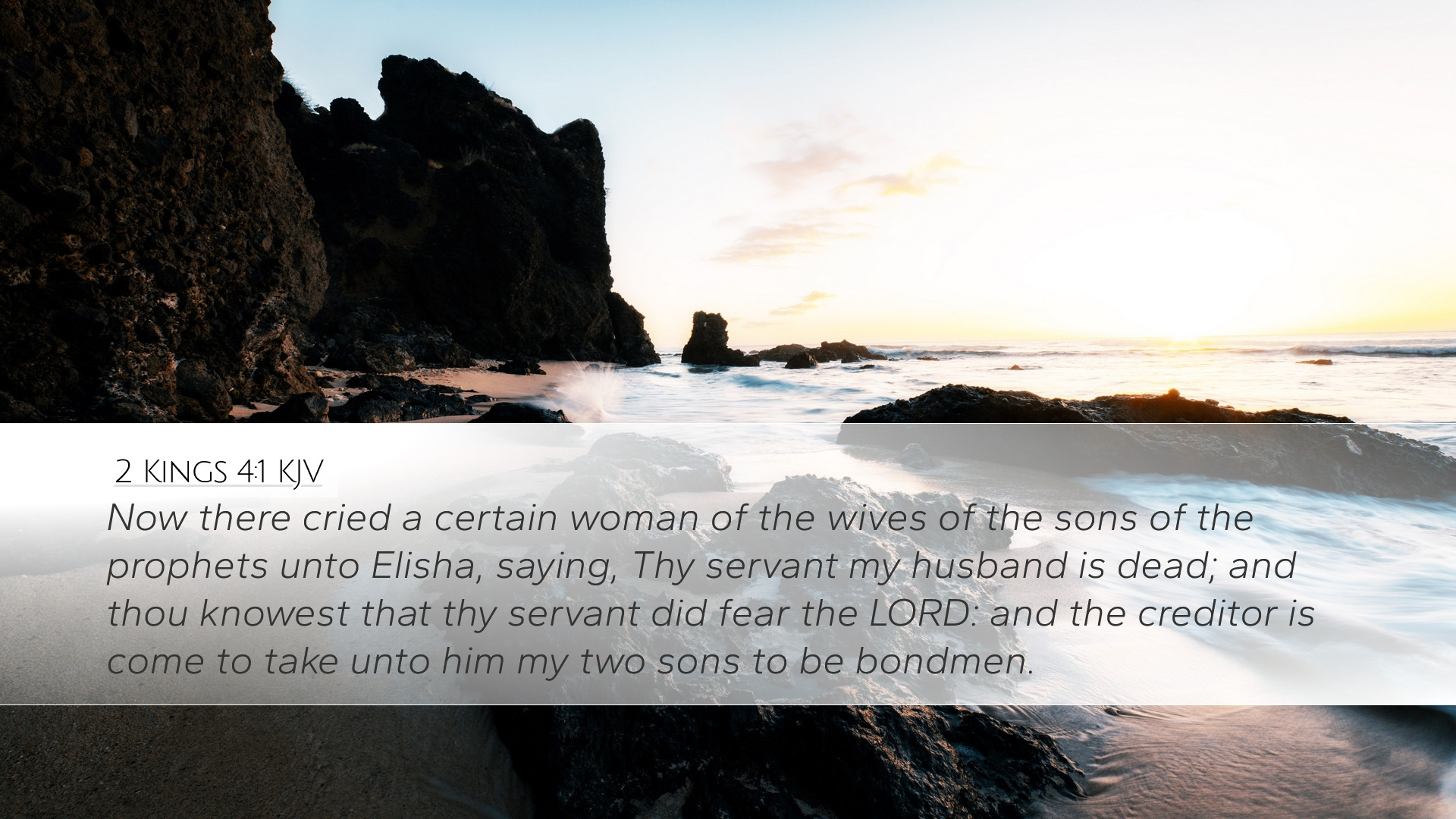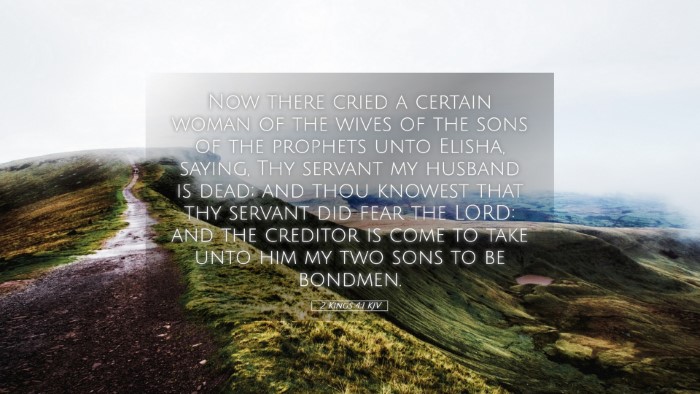Commentary on 2 Kings 4:1
Verse: "Now there cried a certain woman of the wives of the sons of the prophets unto Elisha, saying, Thy servant my husband is dead; and thou knowest that thy servant did fear the LORD: and the creditor is come to take unto him my two sons to be bondmen."
Contextual Background
This encounter occurs during the ministry of the prophet Elisha, a successor to Elijah, who was renowned for his miraculous works and prophetic guidance. This passage introduces a narrative that highlights the struggles faced by the widows and families of ministers, emphasizing themes of faith, desperation, and divine intervention. The woman's plight serves as a microcosm of the broader challenges within Israelite society at the time.
Analysis of the Text
The Cry of Distress
The verse begins with the phrase "Now there cried a certain woman," which denotes a plea born out of urgency and desperation. Matthew Henry observes that this cry underscores the anguish and hopelessness of the woman, as widowhood often left women in vulnerable situations, especially when coupled with financial ruin.
The Identity of the Woman
While the text does not name the woman, her identity as "the wife of one of the sons of the prophets" illustrates her connection to a community of faith. This aspect emphasizes her husband's former dedication to God's service. Albert Barnes notes that her husband’s devotion did not shield her from suffering or financial distress, showcasing that even the righteous can encounter severe trials.
The Financial Crisis
The mention of creditors seeking to take her sons as bondmen presents the social challenges of the time. Adam Clarke explains that such debt would not have merely resulted in financial loss but also the loss of family unity, as the children would be made to serve the creditor. This reflects the harsh realities of ancient Near Eastern economies, where debt could lead to drastic consequences for the poor.
Acknowledgment of God's Fear
In her appeal to Elisha, the woman asserts, "and thou knowest that thy servant did fear the LORD." This acknowledgment of her husband's piety underlines a crucial theme in biblical narratives—that reverence for God does not always shield one from calamity. However, it also implies that the woman may anticipate divine aid due to her husband's faithfulness, which is a point Matthew Henry highlights, emphasizing the necessity of faith amidst adversity.
Theological Reflection
This narrative invites a close examination of the nature of divine providence. The woman's situation reflects the broader struggles of believers, where faith is often tested by distressing circumstances. In understanding this miracle's context, we see that the God of Israel is deeply concerned with the plight of the disenfranchised. Elisha's role signifies that in the face of despair, God acts through His appointed servants, utilizing them as vessels of His compassion and power.
Faith and Desperation
The woman's faith is manifested in her plea for help, not merely in despair, but as a recognition of her situation's severity. Adam Clarke posits that true faith is often borne out of desperation, suggesting that adversity can, in fact, be a catalyst for deeper reliance on God. This theme resonates throughout Scripture, as many individuals encounter God’s provision in their most desperate moments.
God's Compassion for the Vulnerable
This passage exemplifies God’s character, whose attentiveness to the vulnerable is a recurring motif in the biblical narrative. The widow’s cry reflects an invocation of divine justice and mercy, reminding scholars and practitioners that God is a refuge for those in need. Albert Barnes emphasizes that God's grace is particularly manifest in moments of great need, reaffirming His promise to care for the widow and the orphan (Psalm 68:5).
Practical Applications
- Encouragement in Trials: For pastors and students of the Scriptures, this story serves as an encouragement to remain steadfast in faith, even through overwhelming circumstances. It reminds one of God’s faithfulness in providing for those who trust Him.
- Empathy for Others: Understanding the plight of vulnerable individuals in society today can compel us to act in love and mercy, reflecting the compassion of Christ. The church is called to respond to the needs of those who are suffering, just as Elisha did.
- Faith Over Fear: This narrative teaches that acknowledging one's difficulties and appealing for divine assistance is an act of faith. Believers are encouraged not to shy away from expressing their needs to God, demonstrating trust in His provision.
Conclusion
2 Kings 4:1 serves not only as a historical account but also as a poignant reminder of God's awareness of human suffering. It invites reflection upon the nature of faith as intertwined with hardship and reassures believers of God's unwavering commitment to provide for His people. Elisha's intervention is a testament to God’s transformative power, revitalizing hope where despair threatens to prevail.


